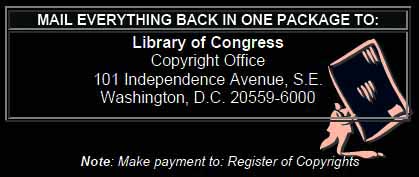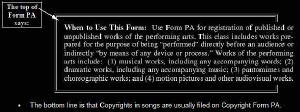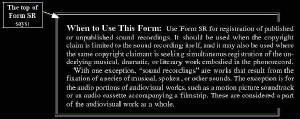|
|
How
To Copyright Music, Beats, and Songs
COPYRIGHTS
The most important step to protect your music, beats and
intellectual property rights, will be making sure that you have registered your music with the Copyright Office
Introduction
The Copyright section of Music Powers has been put together to
give you a basic understanding, along with the steps you should take to protect your music creations. Not having suitable registered proof that you are the owner of your creation may cause you to lose certain
rights that come with registering your works with the Copyright Office. Copyright
Office Registration, and getting the rights that come with it is not to be done with the “poor-man’s copyright;
mailing a copy back to yourself, or any other nonsense, if you plan on having the backing of the US Congress set
of laws and regulations regarding infringement and legislative pay support for music you own the rights to for licensing,
etc. So read this segment of Music Powers, and follow the simple steps to protect
yourself. Also, I have decided to provide a little bit of information for those
of you who may be interested in knowing when to use certain Copyright Forms.
By Definition, What is A Copyright?
A Copyright is the exclusive right, granted by law for a stated period, usually until
70 years after the death of the surviving author of the work, to make, dispose of, and otherwise control copies of literary, musical, dramatic, pictorial and other copyrightable works. The exclusive right is set
forth in the 1976 Copyright Act Section 106.
Now, the law says that Copyright is secured automatically
when the work is created, and a work is "created" when it is fixed in a copy, and that your music actually has a legitimate
copyright as soon as you can get your song or music “fixed” into
a tangible format of expression. This just means that you either need
to get your song recorded into some type of recorder, or get it written down or logged into some type of records file. But to truly protect yourself, along with some very great advantages and benefits
that are backed by the US Government, it’s best to register your music with the Copyright Office.
By registering your music with the Copyright Office, you
will not only have a better record of proof that you are the owner of the music, but you will also get certain rights when
it comes to lawsuits, and benefits for you if you must make a claim for copyright infringement… just incase someone
uses your music without your permission or the right to do so.
How to register your song or beats
To register your song with the Copyright office, do the following:
1. Send
a request for a form SR or PA application to the Copyright Office, Library of Congress, 101 Independence Avenue, S E., Washington,
D.C. 20559-6000 or download the application from the website: www.copyright.gov
2. When
the application is completed (properly), send it back to the Copyright Office with:
(b) If published
- Two copies of manuscript (sheet music) OR a sound recording of the best edition…and
(c) The appropriate non-refundable registration
fee, which is presently $45, by money order, bank draft or check, made payable to Register of Copyrights. (see current fees)

Now, the wait time for application processing, and getting you your certificate back in the mail is kind of long (about
5 to 6 months), but your song is actually registered as soon as the Copyright Office gets your package (if
everything is correct in the package; the application, and the fee).
New! Registration with Electronic
Copyright Office (eCO) The
Copyright Office has now put in a new program that allows you to complete the copyright application online. There are also a few advantages to this new process; a lower filing
fee of $35 for a basic claim, a faster processing time, online tracking, ability to upload, and payments can be made using
a credit card or debit card. For more visit the US Copyright office on the web.
Form PA, Form SR - SO, WHICH ONE?

______________________________

The Music Powers book is helping artists, producers, managers, songwriters, djs and engineers get
"in" the biz and succeed everyday -
Invest in your future , invest in your career &
getting paid; Invest in yourself!

|



|
|
| |
|